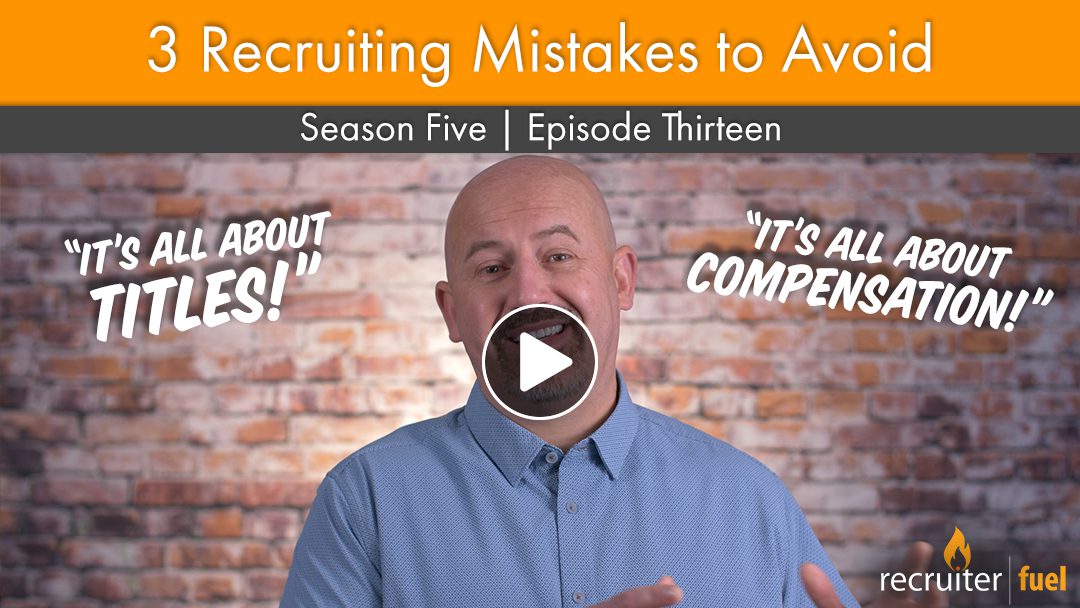
Season 5| Episode 13
3 Recruiting Mistakes to Avoid
In today’s episode, Steve sits down to talk about 3 recruiting mistakes he’s made recently – and how you can avoid them.
Nobody’s perfect, and even after teaching recruiting for two decades, he still makes mistakes here and there – the important part is learning from those recruiting mistakes and helping others avoid them!
Without further ado, let’s dive into 3 recruiting mistakes to watch out for.
REcruiting mistake #1: Thinking That It’s All About the Title
Steve kicked things off by talking about how we can go astray by focusing too much on titles. He just finished a search for a VP a 500 million dollar company, but during that search, he came across a candidate who was perfect for the role – except for their title. The candidate in question was currently a president, which made Steve pass on the candidate. The role he was looking to fill was a VP, though it was really more of a GM role. He just didn’t think a president would be willing to make that transition. It’s a very common recruiting mistake.
“What president is going to make a move to become a VP, even if the business was bigger?”
Ten days later, the client sends them a resume that was referred onto them. Lo and behold, it was the same president Steve had looked at earlier! When Steve talked to the candidate, he realized he had jumped to conclusions. It’s easy to make this recruiting mistake.
“I ended up talking to that candidate, and the title didn’t matter to that particular individual. What really mattered was the opportunity, what mattered was the responsibility, what mattered was the size of the business – I didn’t know any of that, because I skipped past that individual.”
Ultimately, this individual did not get the job, but they did come in at #2. Regardless, it was a great reminder that we should never make assumptions about a candidate based on their title! Though this was at a senior level, we all know it happens at all levels of recruiting. It’s easy to fall into this trap, but we have to avoid this recruiting mistake.
RECRUITING MISTAKE #2: THINKING THAT IT’S ALL ABOUT THE COMPENSATION
Steve then shared another anecdote from a different senior-level search. The search started off with a compensation about $225,000 in base, 30% bonus, and some equity. Steve got the client to push up that compensation up to $250,000-$260,000 as he believed a higher compensation would be more appropriate. Naturally, he was thinking that compensation was going to be a dealbreaker, which is a classic recruiting mistake.
Later, Steve gets on the phone with a candidate who has all the right credentials. When the conversation turned to compensation, the candidate told Steve that he’s at $325,000 base with 50% bonus and equity. Sensing that it wasn’t going to work out, Steve went back to the client and asked if they were interested. Of course, the client said that was much too high, so Steve called the candidate and left a voicemail saying that it probably wouldn’t work out due to compensation. Even with 20 years of experience, we all still make the recruiting mistake of thinking that money is always the most important factor.
Four days later, the candidate called Steve asked for an update on the position. Naturally, Steve told him that he had already left him a message with all the details. But the candidate had something different in mind.
The candidate said, “Steve, we talked about where I was. But ultimately, let me tell you what’s going on. This is what I consider combat pay. Meaning the situation that I was thrust in, the role that I had, the mess that we had, they had to pay me a lot more to take that responsibility on. But the reality of it is, that’s not what I’m looking for.”
The point is, we shouldn’t assume what someone wants based on their current compensation. People will take pay cuts more than you expect. The candidate was working 90-100 hours a week, and he wanted more work-life balance. We’ll see how it works out, but as of this writing, this candidate is now the #1 pick for the new role! We can’t make the recruiting mistake of thinking money dictates the decision making process.
RECRUITING MISTAKE #3: SKILL OVER PURPOSE
We do this, hiring leaders do this, HR does this, we all make this recruiting mistake. Steve admitted that he knows better, but slipped up anyway.
Here’s the rundown on the situation: Steve was doing the intake call for another senior level position, a director for a small business unit. As he talked with the hiring leader, she continued to refer to the prior person in the role and the skill set of that person as related to the job. It’s the classic recruiting mistake of focusing too much on skills and overlooking purpose.
The prior director excelled at using video. She created great internal training videos, she communicated with her staff through video. The hiring leader kept describing the value of these skills. That’s an important step of the intake process, but unfortunately if we focus too much on skills, we miss out on other, more important details. The recruiting mistake here is focusing on the way we get results rather than the results themselves.
“Here’s the problem. We get caught up in the last person, who may have executed on that job in a different way, instead of focusing on the purpose of the position to begin with…that individual that was in that role had a unique skill set that ultimately – it was very clear after a week’s worth of searching – that nobody else had that skill set! She just chose to do it a different way.”
“But through the intake, I had set the expectation – not the hiring leader, I – had set the expectation through my questions and agreement with the hiring leader that I will find somebody who leverages video the exact same way as that particular person who had vacated that position. That person doesn’t exist. We had to go back to the hiring leader and focus on the purpose of the position. What is it ultimately responsible for delivering, not how do we get there.”
We can deliver the necessary results in a multitude of different ways. If we only focus on specific skill sets, we disqualify quality candidates who could give us amazing results. In the case of this search, focusing on specific skill sets left us with a virtually impossible search. This recruiting mistake sets us up for failure and makes us look bad in the eyes of the client.
We have to focus on the purpose, not the skills. Ultimately, businesses care more about if an employee can deliver the required results than how they deliver them – and we have to keep that in mind. This is one of the most common recruiting mistakes!
“LEARN FROM MY MISTAKES”
Steve admitted he wasn’t proud of his mistakes, but it happens to the best of us. The important part is learning a lesson so that we don’t repeat these mistakes again. Hopefully these tips help others avoid these common recruiting mistakes!





